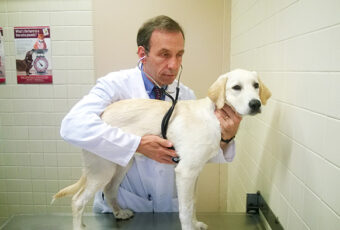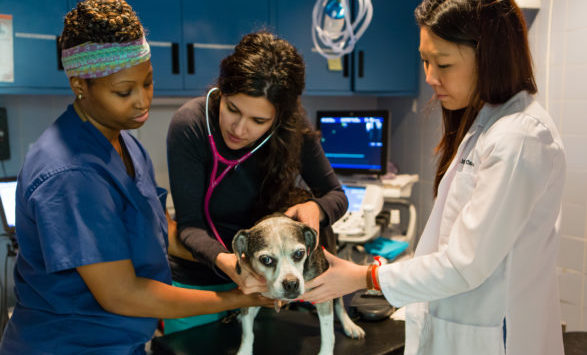Heart Disease in Dogs and Cats

Background
The heart is a hollow muscular organ that is responsible for pumping blood throughout the body. Like any other muscle in the body, the heart relaxes and contracts. When the heart relaxes, blood fills its hollow chambers. As the heart contracts, the blood is expelled into the blood vessels connected to the heart. The blood flow in-and-out of these chambers is controlled by valves. The contraction and relaxation of the heart muscle is controlled by electrical impulses generated by the heart’s own intrinsic pacemaker.
Heart disease refers to any abnormality of the heart that affects its anatomic structure, ability to contract and relax, or electrical impulses that control its rate or rhythm of heartbeats. While both dogs and cats can get heart disease, dogs are more prone to developing structural abnormalities of their heart valves whereas cats are more prone to developing abnormalities of the heart muscle itself. Both species can have abnormalities of their heart rate and rhythm. Abnormalities of structure, contraction, and electrical activity can eventually lead to heart failure, which is the failure of the heart to pump enough blood for the body’s vital organs to function properly.
Risk Factors
Heart disease is a collective term encompassing a wide range of conditions, which can be either congenital (present at birth) or acquired. The following factors can increase the risk of a pet developing heart disease:
- Age – heart disease occurs more frequently in older pets
- Breed – certain heart disorders are more common in particular breeds
- In cats, a taurine deficient diet has been associated with development of dilated cardiomyopathy
- In dogs, the Food and Drug Administration has reported a potential association between grain free diets with the development of dilated cardiomyopathy.
Common types of heart disease in dogs:
- Degenerative valve disease – degenerative valve disease is the most common type of heart disease in dogs. It occurs when the heart valves, which control blood flow between the chambers of the heart, become thickened and inflexible. Their distorted shape prevents the valves from shutting properly. Blood then leaks through the abnormal valves resulting in a heart murmur which can be heard with a stethoscope. In some dogs, progressive degeneration of the heart valves leads to fluid build-up in the lungs, or pulmonary edema. Pulmonary edema is a common finding in congestive heart failure.
- Dilated cardiomyopathy (DCM) – a disease in which the heart muscle thins, stretches, and weakens, decreasing the heart’s ability to pump blood properly. The heart valves may leak because the heart takes on an abnormal shape. Leaky valves cause a build-up of fluid around the lungs and in the abdomen. DCM may result in congestive heart failure.
- Heartworm disease – an infection that develops when an animal is bitten by a mosquito carrying the larvae of the heartworm parasite. The larvae migrate to the blood vessels of the animal’s heart and lungs.
Common types of heart disease in cats:
- Hypertrophic cardiomyopathy (HCM) – a condition in which the walls of the cat’s heart thicken, decreasing its pumping efficiency. HCM can lead to the development of congestive heart failure or the formation of blood clots.
Signs
Signs of cardiovascular disease in dogs may include:
- Exercise intolerance
- Weakness
- Difficulty breathing
- Increased breathing rate
- Abdominal swelling
- Fainting
- Bluish tinge to gums or skin
- Loss of appetite
- Weight loss
Signs of cardiovascular disease in cats may include:
- Difficulty breathing
- Reluctance to lie down
- Weight loss
- Loss of appetite
- Bluish tinge to gums or skin
- Sudden inability to use hind legs because of a blood clot
Diagnosis
Your veterinarian will review your pet’s medical history, perform a physical exam, and may order certain tests or procedures to determine if your pet has heart disease. During the physical examination, the veterinarian will use a stethoscope to listen to your pet’s heart and lungs to listen for an abnormal heart rate, abnormal breathing rate, or abnormal sounds in the lungs or in the heart (such as a heart murmur).
- The common types of procedures used to diagnose heart disease include:
- X-Ray – a chest x-ray can be used to find if a pet’s heart is enlarged or if fluid has accumulated in or around the lungs.
- Electrocardiogram (ECG or EKG) – electric signals cause the heart to contract, thus controlling an animal’s heart rate. An electrocardiogram measures this electrical activity and can be used to detect arrhythmias (heart rhythm or heart rate disturbances).
- Echocardiogram – an echocardiogram is an ultrasound of the heart used to evaluate the physical structure and motion of the heart and blood flow through the major blood vessels.
- Brain Natriuretic Peptide (BNP) – a blood test may be ordered to detect increased levels of BNP, a small hormone produced by the heart. Production of BNP increases when the heart muscle is stretched excessively. This test helps veterinary cardiologists differentiate lung disease from heart disease.
Treatment
The treatment for heart disease in pets will depend on the underlying disorder. Unfortunately, many cardiovascular diseases never completely disappear, but they can be managed through different treatment options. These may include medications,, and/or dietary changes.
Depending on the underlying condition, treatment for heart disease may attempt to minimize damage to the heart, control fluid accumulation in the lungs, improve circulation, regulate heart rate, ensure adequate levels of oxygen in the blood, and/or minimize risk of blood clots. Drugs that may be prescribed for cardiovascular disease include:
-
- Diuretics – help to remove fluid that accumulates in dogs and cats with heart disease
- ACE inhibitors – may be used to treat heart failure and high blood pressure by relaxing and enlarging blood vessels.
- Pimobendan – opens up the blood vessels that take blood away from the heart, effectively reducing work the heart does to pump blood. At the same time, it opens up the blood vessels returning blood to the heart, reducing pressure on the heart. Also increases the strength of the heart’s contraction.
- Antiarrhythmic medications – drugs to increase a slow heart rate, decrease a fast heart rate or decrease the occurrence of abnormal heart beats.
Prevention
While heart disease has a variety of causes, pet owners can take steps to help their cat or dog be heart healthy. This includes keeping your pet at a healthy body weight, exercising your pet daily, and taking your pet for their annual check-up with your veterinarian.
Make an Appointment































